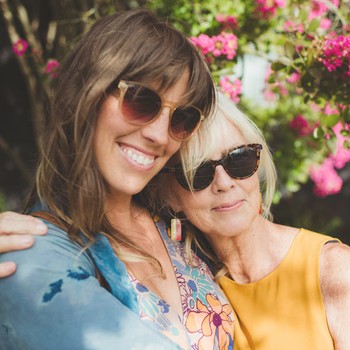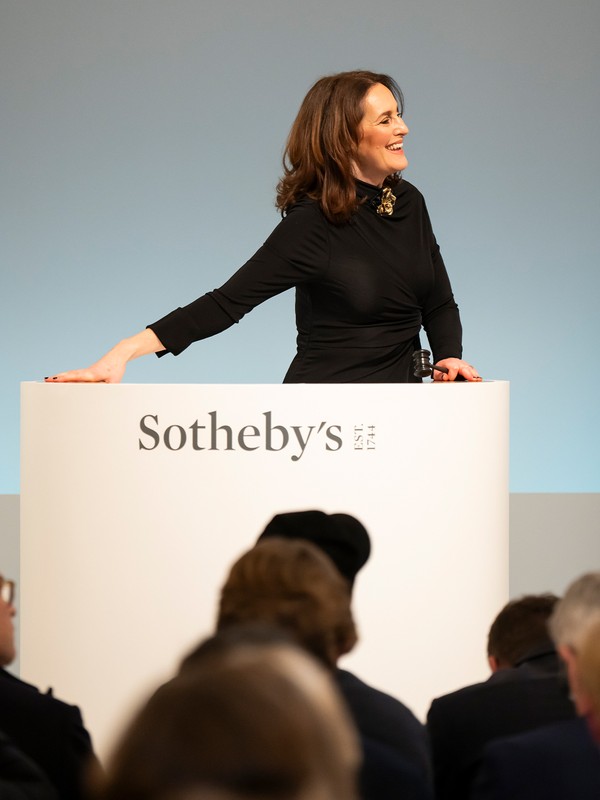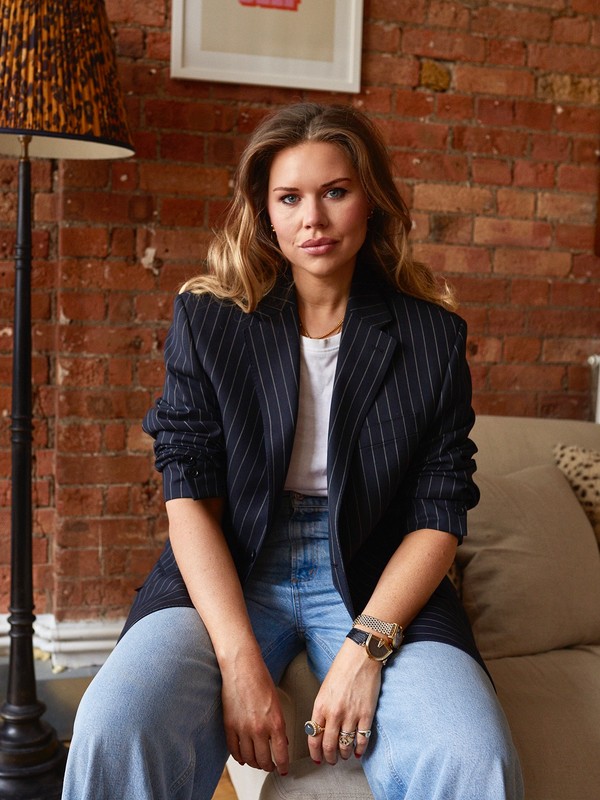What It’s Like To Go Into Business With Your Mum
Helen & Daniela Boleto: Camomile
Helen and Daniela Boleto launched children’s interiors company Camomile London after the birth of Daniela’s first son. Providing stylish bedding and accessories for the design-conscious parent, the seed for their successful business was planted when the pair worked together at Hobbs.
What lead to you creating Camomile?
Daniela: My first job was as a designer with MaxMara in Italy. I could have spent the rest of my life in Italy but I missed my family, which brought me back to the UK after four years, where I took a job at Hobbs. At the time, my mother was the Head of Design and they were looking for someone to create a younger, diverse line. I worked under her, which was amazing because we’re very close.
Helen: I studied at the London School of Fashion and eventually launched my own ladieswear couture line, but once I had my children, I saw a gap in the market for fashionable baby wear – in the eighties, Mothercare were just selling pink and pale blue items, so I created my own brand. From there I was then head-hunted and became Head of Design at Mothercare. After that I worked for Hobbs as Head of Design. I was worried about how it would be perceived in the company when Daniela came in – she was truly amazing. I soon realised how talented she was and that we would probably end up working together and creating our own brand. I had that little seed planted in my head for a long time.
Daniela: My mother eventually left and ended up working at Toast in Wales, but when I fell pregnant, she didn’t want to miss out on being part of her grandchild’s upbringing, so she moved back to London. We started decorating my son’s nursery and then just didn’t stop – we decided that we could make a brand that would appeal to people like us, who had a certain taste that was missing from the British market at the time. Because we both had contacts from within the industry, it was easy for us to work with some very trusted manufacturers who we knew had exceptional quality. That’s how Camomile London was born.
Was it a challenge to go from fashion to interiors?
Daniela: It was, but it just felt natural to try something new rather than do a children’s clothing line. When we started talking about it, we were looking from a creative personal perspective of what would I want for my child’s room. That’s how we approached Camomile – we don’t look at competitors because that can really cloud your judgement. There’ll be those who love it and those who are not so drawn to it, but that’s what we’re trying to achieve, we’re not trying to reach mass market.
What was the most important thing you wanted to focus on when you started up the business?
Daniela: Quality. The market for children’s interiors is diverse in terms of design, but the quality is poor. When you have a newborn, that baby means everything to you – you care about what they’re sleeping in. So, we wanted to make sure we were bringing products to the market that had attention to detail.
Did you have any reservations about going into business together?
Helen: Not at all. Daniela’s the Creative Director, I don’t need to support her – she’s very capable, so I never make her feel that I’m her Mum and she must listen to me. I listen to her really, she’s got great ideas.
Do you ever argue about work?
Daniela: No, never. Inside the office we have our distinct roles and we respect each other in those roles. We learnt how to do this by working together at Hobbs. I had to talk to her in a manner that was professional and we’ve taken that on within our own brand. We share respect for each other as our abilities as designers, so it’s that mutual respect that allows you to have a conversation about something. Especially when an item comes in and it’s not right, automatically you will get emotional, but we manage not to allow that mother and daughter relationship to play into it.
What do your family think about the two of you being in business together?
Daniela: My parents ran a business together in the eighties, so it feels very natural. But my dad helps sometimes, my husband and my brother get involved too when we need extra hands – it does become a big family affair. At the beginning they would tell us over the dinner table, “enough talking about work now”, but I think we’ve learnt over the years to separate business and pleasure.
Do you feel you’re quite in-sync with your ideas?
Helen: Yes, for sure. I can walk into any store and point out the things I know Daniela would like and she would do the same. I think that’s what really helps creating this brand.
Do you have any set rules to ensure your work doesn’t affect your family life?
Daniela: In the evenings and at weekends there’s no business chat, especially when we’re all together as a family. And we give each other space too if there’s a very busy period, but there’s never any conflict.
What are your individual roles within the business?
Daniela: I’m Head of Design, so I will come up with the ideas and put forward the plan creatively. I’m also in charge of the graphics and the website – although I always seek my mother’s opinion. Creating the collection, we’ll come up with the ideas together, I’ll then work on them further. Mum is in charge of the production and the wholesale side, which is a massive part of the business, crunching numbers and working with our manufacturers.
What was your biggest challenge when you launched Camomile?
Daniela: The level of support you need when you start a business. There are so many obstacles; it’s a really difficult climate out there. To be able to tackle those obstacles with a member of your family is what drove me to succeed, and still does. I don’t know if I would have had the morale and strength to get through the daily obstacles if I hadn’t been working with mum, I would have been too exhausted, but having our own business has meant that when it was difficult, we could support each other and then enjoy the success after.
What advice would you give to family members who are considering going into business together?
Helen: It’s not for everyone. I have good friends who couldn’t do this with their daughter. We both do the same job and like the same things, so that all helps. It’s not just about being a mother and daughter, it’s about whether you’re on the same wavelength.
Sara Person & Clemmie Mason-Pearson: Spider PR
While Sara launched her public relations company Spider PR 25 years ago, Clemmie joined the business in 2012, becoming Director of travel and lifestyle. She left in 2017 to start her own PR company, Kitten & Shark, but the two businesses remain a collaborative project – they even share the same building.
How did you both get into PR?
Sara: I started at the Sunday Telegraph as a trainee journalist and then moved into PR. I worked at three different agencies and became a board director. Before there was maternity leave, the most I had off was four weeks for all three of my children. About two weeks into my time off after having my son, I was called into a board meeting. I couldn’t keep up breastfeeding my baby and go into work for meetings so I thought, I’m going to call it quits. I then had about a month to start a business and generate the same level of income I had as a director. I started it in tricky circumstances, bouncing a newborn and a toddler running around my legs, but a very good business came out of it.
Clemmie: I began working for a travel PR straight out of university but left after four years to work for my brother who had a small PR agency. Working for him was not the easiest, and after a while we thought enough is enough – we’d rather just be brother and sister. That’s when I started working for mum.
What’s the main difference between working with your brother and your mum?
Clemmie: Your mother is always going to be more authoritative. It’s easier to take direction from her – when you’re working for your brother it can be hard to take direction. But my mum had been in PR for so long, I wanted to learn from her.
What drew you both to PR?
Sara: When I left the Telegraph, I worked for a jockey club. All I had to do was write a little bit of copy – that was an entire day’s work. After that I was introduced to an agency, and they were literally paying double the amount I was on, which was very appealing. So, I hate to say it, but initially it was the money that drove me. As a career it’s a wonderful thing – you can choose to be a specialist or a generalist. I’m a generalist – one day I’m dealing with Peperami, the next it’s Fedex. They’re very different but all have challenges.
Clemmie: I didn’t have much of a choice – my whole family work in PR. My mum and my brother have their own agencies. I’ve grown up with PR all my life.
What was it like working together?
Sara: There was a degree of trepidation, but we’ve had surprisingly few arguments – we’ve had a few half-day standoffs, but soon realised that wasn’t very productive. From my point of view, it was an enormous privilege having Clemmie learn and grow here.
How did you keep a professional relationship in the office?
Clemmie: Particularly when it came to clients, we acted as if we weren’t mother and daughter, and tried to be as professional as possible. I’d call my mum Sara, particularly in new business meetings. However, we look very alike, but we leave it up to them to guess if we’re related or not.
Did you have any reservations about going into business together?
Sara: Oh god no. But if it had started to impact on our family relationship, we would have both agreed it wasn’t working. The reason Clemmie decided to break out and do her own thing was because the time was right. We still collaborate – if we need something that requires her skills, we’ll bring her in, and if she needs help, because we have a bigger team, we’ll help. I’ll always look back on our time working together as a happy, successful time.
Clemmie, was it bittersweet leaving you mum’s business?
Clemmie: It took a lot of courage for me to leave. Telling my mum I was leaving was much harder than telling my brother. It was difficult, you don’t want to quit because you don’t want to upset anyone, but she supported me.
Sara: We went away and fleshed out a business plan for Kitten & Shark and how it would work. We walked and talked and worked out how we could make it successful.
Was there anything that was made easier by the fact you were related?
Clemmie: My mum is far more experienced than me, but we’re made of the same genetics – we’ve got the same drive and determination.
Sara: For me, the thing that would have torpedoed this whole thing is if Clemmie had a different work ethic, but she’s very much a chip off the old block. She’s very focused and driven. She didn’t join and think she could put her feet up – she had to be contributing like anybody else. Even more so, if anything. It was important for people to feel she wasn’t getting preferential treatment.
Are there any skills you’ve been able to teach each other?
Clemmie: When it comes to being the boss you have to take control and keep a level head. You have to be able to take the reins. I definitely learnt that from my mum. She’s taught me everything I know about running a PR agency and winning new business.
Sara: Clemmie’s the next generation. There are things she does differently, but I can learn from that. She’s more in tune with media, how it’s changed and how its evolving.
What’s the best thing about owning your own business?
Sara: Having started it when I had two young children, the great thing is you can work around your schedule. I’ve always worked full-time, but I made sure I did the school run. I had very strong rules in my life, most important was to have weekends with my children. The flexibility was hugely important.
Clemmie: The flexibility, but from a different point of view. Choosing clients that you really are passionate about and want to work with. Building a team of people who I want to work with and enjoy spending my time with.
What did you enjoy most while working together?
Clemmie: We’re quite a tight family, so being able to see my mum every day was great. I respected learning from my mum as a boss more than I would have done with anyone else.
Sara: I’m enormously privileged that I work with two of my children, [Sara’s son also works in the same building] I get to see them every day. I’m the luckiest woman in the world, I see them every day of the week.
What advice would you give to other mothers and daughters starting a business together?
Sara: Give each other space and respect – don’t say, “Well I’m your mother, So I’m right”. That won’t work. You must be the grown-ups that you are. If you can do that, I couldn’t recommend it more highly.
Lynette and Cloe de la Vega: Abuelo Café
Lynette and Cloe de la Vega both had successful ventures in the food industry before joining forces to start Abuelo Café – Lynette worked in architecture designing cafés, and Cloe ran a successful business in Sydney selling Argentinian fare. But it wasn’t long before they brought their skills together to open their Australian-meets-South-American coffee house. Here, they tell us the secret behind their unique USP and how family is behind everything they do.
Who came up with the idea for the business?
Cloe: We’re both very analytical – one thing we do together is always talk about what works and what doesn't with the things we see around us, whether that’s movies, architecture, advertising, or cafes/restaurants. When we were discussing architecture and food in particular, we were really passionate about our likes and dislikes, and that developed into a fully formed concept. The fact that we couldn't stop bouncing around ideas told us that we needed to try and build our own business.
Lynette: I had a number of successful restaurants in the eighties and had designed over 50 for clients, and just wanted to get back into it. Cloe had a successful street food business markets catering for festivals and events, as well as constantly doing cook-ups for huge parties at home, so we already had interest and experience in food.
Cloe: Cafés and restaurants are a perfect expression of our creative skills – for us, they’re architecture, art, styling, food design and creative direction, all in one place.
What was your biggest priority when opening the café?
Cloe: The most important thing was always the interiors. As design-minded people, we find that the thing that’s missing across the food industry is nicely designed spaces. We wanted it to feel warm and friendly.
Why did you choose to focus on Australian-meets-South American food?
Lynette: With Argentinian and Australian heritage, myself and Cloe wanted to create something truly unique that reflected both cultures.Our food menu combines family recipes, handed down by Cloe’s Abuelo (grandpa in Spanish), with global ingredients and an unfussy, relaxed Australian ethos.
What does your family think about the two of you in business together?
Cloe: All of the de la Vega’s have always worked together as a family so it's not weird to us – everyone brings their skills to whatever’s needed – we’re very supportive of each other.
Did you have any reservations about going into business together?
Lynette: We didn't think twice about working together – it was always a given that it would happen one day, we’re just too in sync with each other to not. We always knew we would do some sort of creative or design work together.
How do you think your mother/daughter bond works to your advantage in the workplace?
Cloe: It creates a sense of family in the culture of our business, which is important to us not just conceptually, but practically – it means our staff are really close with us and feel like they are part of something that they care about.
What is a typical day for you both?
Cloe: It depends on the day but usually it’s a combination of emails, sitting at the desk working on accounts, architectural work, staffing, payslip and taking phone calls. Then we go to the café together to check everything is running smoothly, have a coffee, talk to the staff and chat with the customers. Following this, we may develop new recipes, or problem solve any issues that may have come up that day.
What the best thing about owning your own business?
Lynette: You can work on your own time and be more flexible. Plus, you’re able to have more control of the vision you want to create.
Do you still want to spend time together outside of work?
Lynette: We spend so much time together. We go out to eat, shopping, see shows – all the normal mother-daughter things. It's pretty much the same as anyone else, except when we go to work, we're both there.
How do you deal with a work disagreement – and is it different from the way you deal with a family disagreement?
Lynette: In our family we have always dealt with disagreements the same whether at work or at home: by talking things through reasonably. As a result, it's more of a discussion than a disagreement. Once we've talked both sides out it's always pretty clear where the right answer lies.
What do you like best about working with each other?
Cloe: It's nice that we can emotionally support each other, which is probably something that most other teams can't do. We can talk openly about absolutely anything with each other.
DISCLAIMER: We endeavour to always credit the correct original source of every image we use. If you think a credit may be incorrect, please contact us at info@sheerluxe.com.




